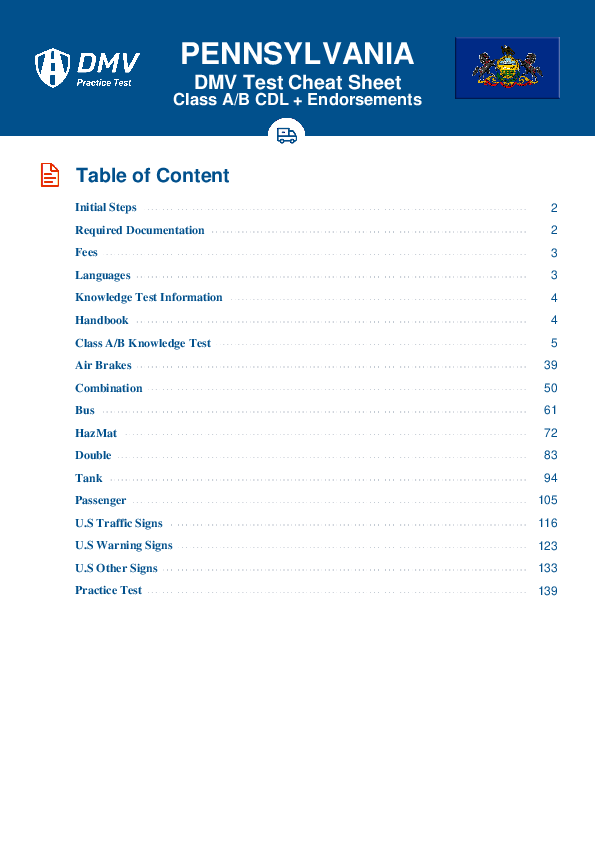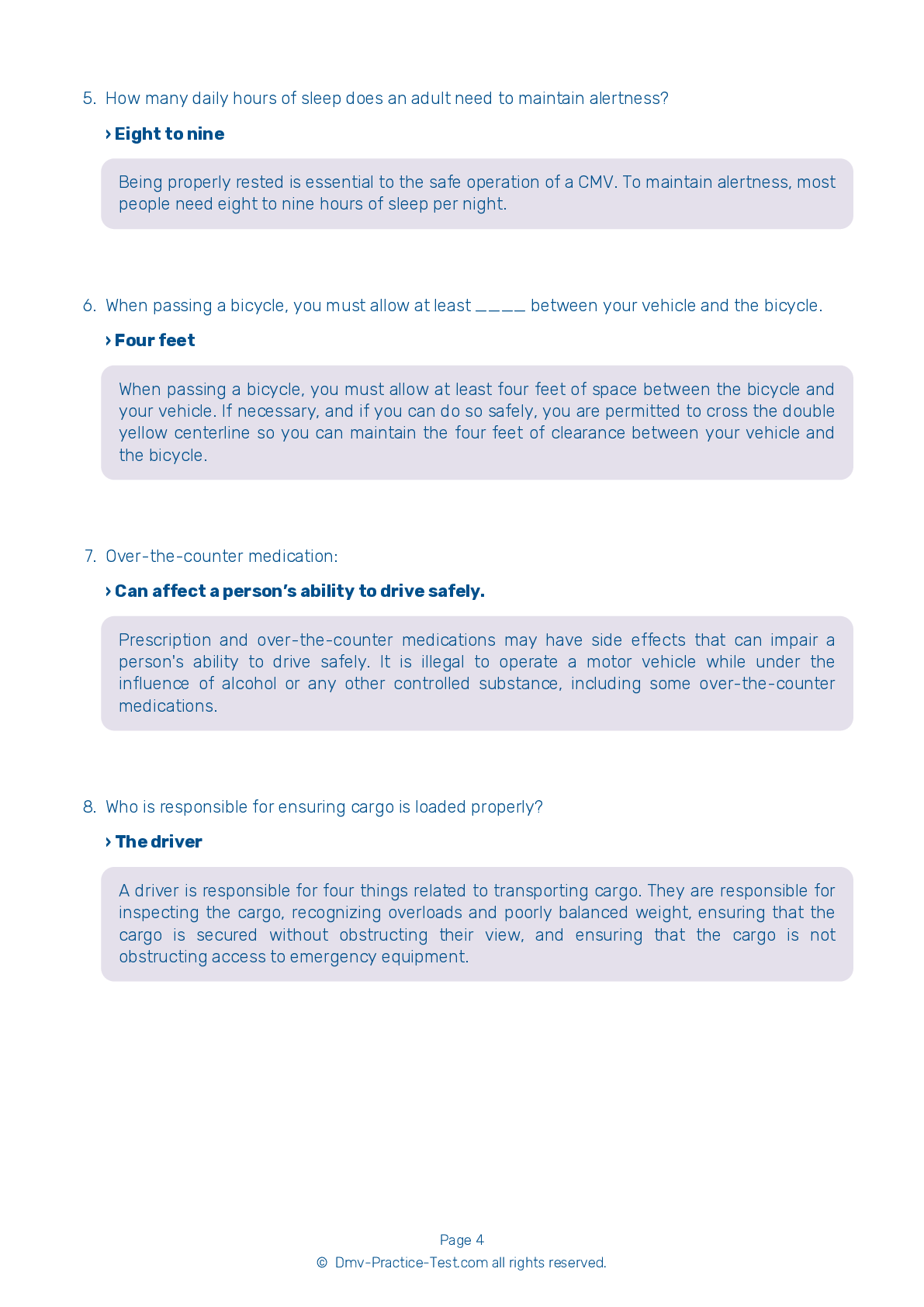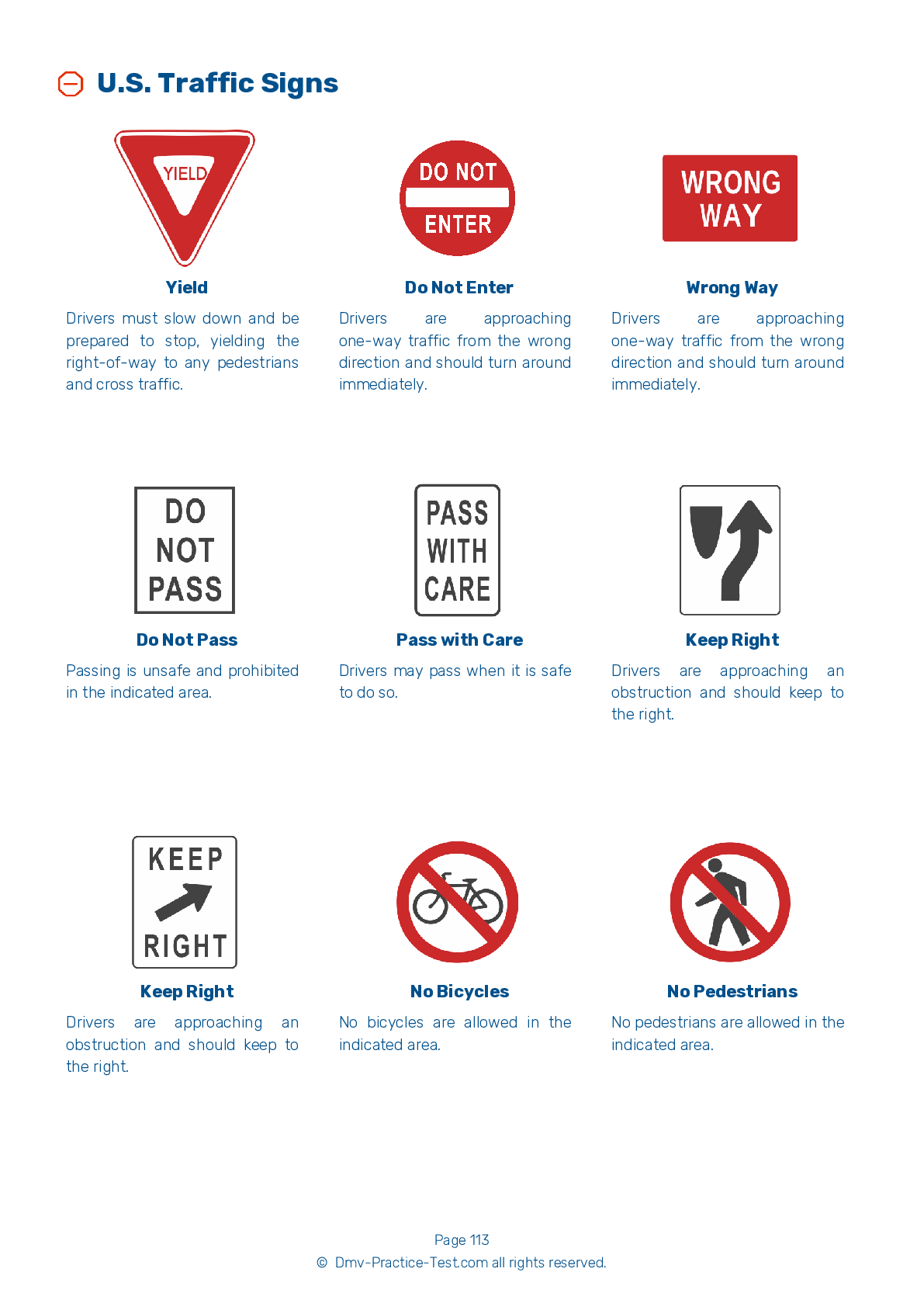Double #1
Double Triple Test | Pennsylvania 2026 #1
Train for FREE with our Pennsylvania CDL double triple practice test online. The official exam test consists of several obligatory parts, with all of them checking your knowledge of different blocks of road rules. If you need to obtain a PA CDL double triple license in 2026, practice as much as possible. Free sample tests published on our website will help you check and improve your knowledge and boost your grades. Please bear in mind that DMV requirements may vary from state to state.
20
16
20
1 . Beginning in what year were converter dollies required to be manufactured with ABS?
Converter dollies are not required to have ABS.
Dollies manufactured on or after March 1, 1998 must have Anti-Lock Braking Systems (ABS). A dolly with ABS must be identifiable by a yellow lamp on its left side.
2 . To stop in a vehicle that uses air brakes, the driver should:
Pull the brake pedal up.
To make a normal stop in a vehicle with air brakes, push the brake pedal down. The harder the pedal is pressed, the more air pressure is released.
3 . If an Anti-Lock Braking System (ABS) is equipped on a trailer but not on a tractor:
The tractor and trailer can still be used together.
A vehicle being equipped with anti-lock brakes on only the tractor or only the trailer provides additional control during braking.
4 . Bicyclists are:
Not allowed on the roadway.
Bicyclists are considered vehicle operators and, with certain exceptions, must obey the same laws as other traffic. They may ride on the shoulder or berm, but are not required to do so. They may also travel at less than the minimum posted speed limit without being cited for a traffic violation.
5 . If an Anti-Lock Braking System (ABS) malfunctions:
The brakes will not work.
On a vehicle with ABS, a yellow malfunction lamp on the instrument panel will illuminate to alert you if the braking system is not working.
6 . When coupling a triple trailer rig:
The order in which trailers are coupled is not important.
When coupling a triple trailer rig, you should first couple the trailer immediately behind the cab. Connect the second and third converter dollies and trailers in order.
7 . If the brake pads rub against the brake drums and create too much heat:
The air compressor will kick on to cool the brakes.
Brakes heat up with use. If they are overused and become too hot, expansion and chemical changes will make them less effective and eventually cause them to stop working altogether. This is known as "brake fade."
2026 Pennsylvania | Frequently Asked Questions
To get a CDL Hazmat endorsement in Pennsylvania, first obtain a Commercial Driver's License (CDL). Then, pass the Hazardous Materials Endorsement Knowledge Test. After passing, you'll need to undergo a federal TSA background check. Once cleared, take your test results and TSA clearance to PennDOT to have the Hazmat endorsement added to your CDL.
To obtain a CDL Hazmat license, you must first have a Commercial Driver's License (CDL). You must also be at least 21 years old, be a U.S. citizen or have legal status, and be able to read and speak English. Additionally, you'll need to pass a Hazardous Materials Endorsement Knowledge Test and a TSA background check.
When applying for a CDL Hazmat endorsement, you'll need your current Commercial Driver's License (CDL), proof of U.S. citizenship or legal status (like a passport or birth certificate), and a completed Hazardous Materials Endorsement application. You'll also need to provide your TSA background check results once they're available.
Yes, there is a dedicated written test for the CDL Hazmat endorsement. The Hazardous Materials Endorsement Knowledge Test covers information related to transporting hazardous materials safely. This includes understanding hazard classifications, placarding rules, loading and unloading procedures, and emergency response procedures. It's important to study thoroughly to pass this test.
The written test for the CDL Hazmat endorsement covers a variety of topics related to hazardous materials. These include identifying different types of hazardous materials, understanding shipping papers and placards, knowing how to safely load and unload hazardous materials, understanding the rules for transporting hazardous materials, and knowing what to do in case of an emergency situation.
Yes, there are additional charges associated with obtaining a CDL Hazmat endorsement. You'll need to pay for the TSA background check, which costs around $86.50. Additionally, the Pennsylvania Department of Transportation charges a fee for adding the Hazmat endorsement to your CDL, which is typically $5.00. However, these fees can vary and may change over time.
Yes, obtaining a CDL Hazmat endorsement in Pennsylvania requires a background check. The Transportation Security Administration (TSA) conducts this check to ensure you're not a security risk. This process includes fingerprinting and checking criminal, immigration, and mental health records. Only after passing this check can you receive your Hazmat endorsement.
Yes, specialized training is required for the CDL Hazmat endorsement. Applicants must pass a written test covering topics such as loading and unloading hazardous materials, bulk tank loading, and driver responsibilities. After passing the test, they are granted the Hazmat endorsement on their CDL. It's important to study the Pennsylvania CDL manual's hazardous materials section to prepare.
No, you cannot legally transport hazardous materials without a valid CDL Hazmat endorsement in Pennsylvania. This endorsement ensures that drivers have the necessary knowledge and skills to safely handle and transport hazardous materials. Violating this regulation can result in hefty fines, license suspension, or even imprisonment.
Yes, you can add the CDL Hazmat endorsement to your current CDL license in Pennsylvania. You don't need to apply for a new license. However, you must pass the Hazmat knowledge test and undergo a TSA background check. Once these are successfully completed, the Hazmat endorsement will be added to your existing CDL.



